Класс: 5 «В»
День: 15.10.2014
Учитель: Есимханова А.Н
Тема урока: “My house”
Цели урока:
Образовательный аспект: тренировать учащихся в самостоятельном употреблений лексики по теме, учить описывать комнату, закрепить грамматические навыки (конструкция There is/ there are и употребление английских предлогов), развивать навыки аудирования.
Развивающий аспект: развитие произносительных навыков; развитие памяти и внимания; развитие творческих способностей детей.
Воспитательный аспект: воспитывать умение работать в парах и самостоятельно; прививать любовь и интерес к иностранному языку.
Тип урока: урок усвоения нового материала
Вид урока: комбинированный
Наглядность урока: презентация, мультимедийный проектор (для показа презентации), интернет, компьютер.
Методы урока: обучение, объяснение, демонстрация, элементы игр, групповая работа
Ожидаемые результаты: Расширение кругозора и творческие способности у учащихся по теме.
План урока:
I. Organization moment
II. Phonetic drill
III. New lesson
IV. New words
V. The development skill speech.
VI. The rhythmic pause
VI. The Development skill lexical-grammatical skill in written speech
VII. Play-competition
VIII. Consolidation the material
IX. Evaluation of the pupil activities
X Home task
XI. Conclusion
Ход урока:
I. Organization moment: Good morning pupils! I’m very glad to see you. Take your seat, please!
Greeting: Who on duty today?
What date is it today?
What day of the week today?
Who is absent today?
What season is it now?
Thank you sit down please!Today we shall speak about the place we live. The English people say: “East or West home is best’. What does this proverb mean? Give the Kazakh and Russian equivalents of the proverb.Thank you! You are quit very well.
II. Phonetic drill: So the theme of our lesson is: “My house” At the beginning of our lesson we as usual have a phonetic drill: let’s repeat a poem. Look at the screen. What’s this?
The armchair, the carpet, the lamp, the window. Repeat after me.
The armchair is green,
The carpet is bright,
The lamp is yellow,
The window is white.
Nice! At home try to compose your own poem.
III. New lesson:
So how do you think, what is the topic of our lesson? (My flat. My home. My house). Yes, you are right! Today you will work in groups. The first row will be the first group, the second row - the second group. For each correct answer I will give you a smile, at the end of the lesson we will count them and choose the best teem and the best pupils. Ready?
First of all let’s make up the proverbs from these words. Let’s check! Look at the screen.
Gr1: There is no place like home.
Home, sweet home
Gr2: My home is my castle
A house is not a home
Excellent!
IV. New words: Now let’s remember all the words. Look at the display. Repeat, please
door – дверь
window – окно
stairs – ступеньки
living room – гостиная
bathroom – ванная
dining room – столовая
kitchen – кухня
bedroom – спальня
drapes – шторы
mirror – зеркало
lamp – лампа
curtains – занавески
couch – диван
bed – кровать
coffee table – кофейный столик
chair – стул
clock – часы
desk – рабочий стол
armchair – кресло
Name them one by one. Ok Thank you!
V. The development skill speech. Now, work in pairs. What is there in the kitchen/ bathroom/ living-room/bedroom? Begin your answers with there is/there are.
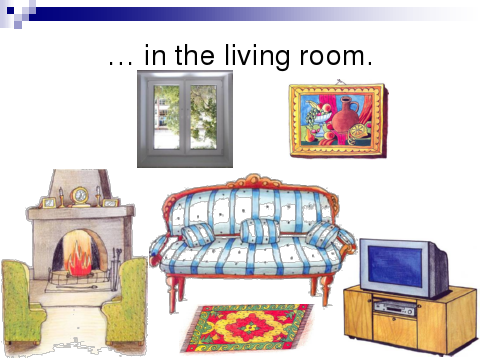
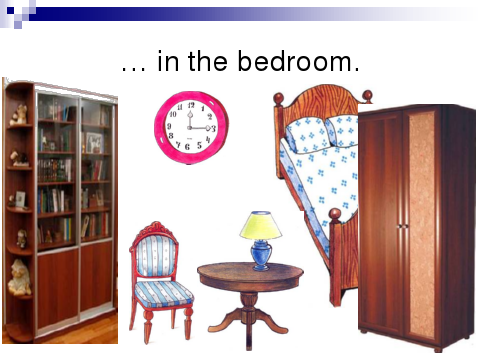
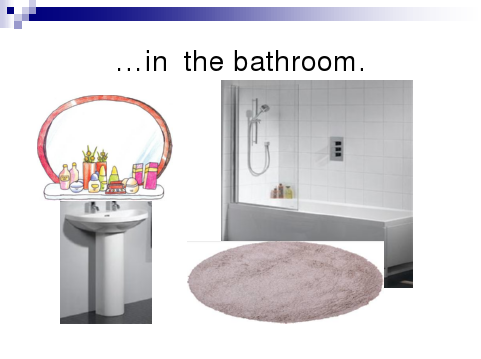
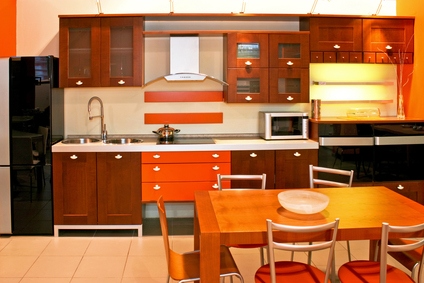
VI. The rhythmic pause: Very good. Now we can make up sentences. We worked hard and we need a rest. Let's go to have a bit of dance and exercises.
Stand up.
Hands up.
Hands down.
Hands on heeps.
Sit down.
Stand up.
Bent left, bent right.
VI. The Development skill lexical-grammatical skill in written speech: Let’s continuo. And now look at the screen. Let’s remember the prepositions. Repeat after me, please. Translate.
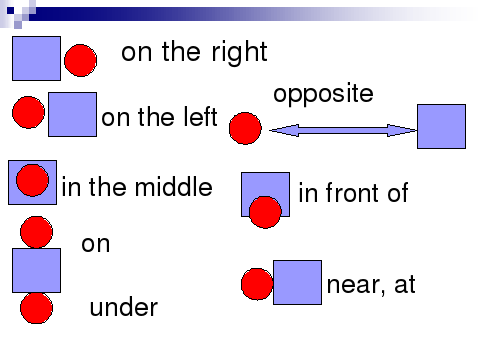
Now pupils we remember the prepositions .Look at the picture and complete the sentences with the correct prepositions.
on the right in the middle on
at under in front of
near opposite
There is a fireplace… the mirror... of the room.
There is an armchair … the fireplace.
There is a coffee table …. the sofa.
There is a carpet … the room.
There is a sofa … the window.
There is a cat … the carpet... the fireplace
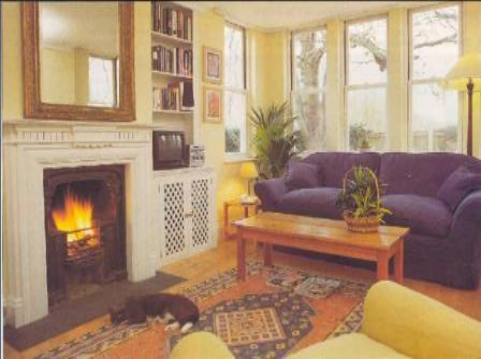
Have you finished? There are correct answer for the task. Ok. It’s very well.
VII. Play-competition: Work in groups. I will give you a paper. Your task is draw a picture of your room. Then one pupil should describe the room.
Gr1: Living room
Gr2: Kitchen
Ok. You have done it. It’s very well. Home is full of happinessThe perfect place for me
Home is always full of loveIt’s where we want to be!
VIII. Consolidation the material: Pupil’s, did you like our lesson? Thank you for your wonderful work!
You know the new words
You can ask question
You can speak on this topic
IX. Evaluation of the pupil activities: Pupils let's count your mails. How many mails hove you got the first row and second row? So the Winner are the “______” . Our congratulation to you! All the team will get a “5”. Those who haven’t won today don’t worry. I’m sure next time you will do your best and win. All of you will get a “4”.
X Home task: How do you think what will be your homework? Draw a picture of your room or make a project like this and describe your room.
XI. Conclusion: Our lesson is over. Thank you for your active work at the lesson. Good bye!
Методическая разработка урока английского языка по теме: «Туризм».
Методическая карта занятия
| Дисциплина: | Английский язык. |
| Тема занятия: | «Tourism in Britain» |
| Преподаватель: | Есимханова А.Н |
| Тип занятия: | Комбинированный. |
| Организация деятельности на уроке: | Работа в группах, в парах в режиме «преподаватель-ученик», индивидуальная. |
Цели урока: отработка лексики по теме “ Виды туризма в Британии” в монологических и диалогических высказываниях; активизация ранее изученной лексики по теме: “City.Village”
Развитие памяти, мышления, воображения учащихся;
Развитие творческого потенциала учащихся;
Развитие коммуникативной компетенции учащихся в чтении, аудировании, устной речи на основе прослушанного текста.
Развитие коммуникативной активности на уроке, мотивации к изучению иностранного языка.
Задачи урока:
Образовательные:
способствовать развитию практического владения языком, умению вести беседу;
расширить кругозор по теме;
реализовать межпредметные связи (география.история Санкт-Петербурга).
Познавательные:
Воспитательные:
создавать условия для формирования способности к критическому мышлению;
воспитывать умение внимательно слушать и слышать, уважать другое мнение;
Развивающие:
Оснащение урока: карты, презентация PowerPoint, компьютер, мультипроектор, DVD “INSIDEOUT”, раздаточный материал, стенгазета «Weenjoytravelling».
Ход урока
I. Организационный момент: Приветствие и сообщение цели урока.
Teacher: Good morning, students. Sit down, please. I’m glad to see you. How are you today? Today we’ll discuss the question “What do people travel for?” So the topic of our lesson is “Tourism. Travelling” .The aim of our lesson is to learn new words and word expressions andto sum up the material on the topic.You’ll read and listen to the texts about tourism. You’ll name and discuss different kinds of travelling. You’ll present your projects and work in small groups.Фонетическая зарядка. На доске – английские пословицы по теме урока. Учащиеся должны прослушать, прочитать и перевести их.
So many countries, so many customs.- Сколько стран, столько и обычаев.
When at Rome, do as Romans do. - Когда находишься в Риме, поступай как римляне. В чужой монастырь со своим уставом не ходят.
East or West – home is best.-Запад или Восток, дома лучше всего. В гостях хорошо, а дома лучше.
II. Основная часть. Проверка домашнего задания.
Teacher: Your home task was to make up a list of words on the topic “Tourism”. Choose one or two the most interesting words from your list and write down on the blackboard.
Учащиеся пишут на доске по 1-2 слова из составленного дома списка слов по теме: «Tourism».
Введение нового материала. Чтение и перевод новых слов:
Sightseeingtour – осмотр достопримечательностей
Exciting -захватывающий
Bored – скучный
Toenjoy – наслаждаться, получать удовольствие
Healthresort – оздоровительныйкурорт
Countryside – деревня
Hitchhiking- путешествиеавтостопом
Reindeeranddogsled – оленьяисобачьяупряжка
Accommodation – жилье, помещение
B&B(bed&breakfast) – кровать и завтрак
Tent - палатка
Rentedflat(house) – арендованная квартира (дом)
Toprefer - предпочитать
Чтение и перевод текста по теме с использованием новых слов (текст представлен в виде презентации).
“Tourism”.(презентация) Слайд 1. A sightseeing tour Travelling is the best way to spend holidays. You may do a bit or a lot of sightseeing on holiday. When you are on sightseeing, it helps to buy a guidebook or a map of the city you are in.Слайд 2. A sightseeing tour European countries with a long, fascinating history and traditions won’t leave you bored.Слайд 3. A sightseeing tour We have a lot of historical places to see in Russia.Слайд 4. On the beach Those who want to relax and spend some time by the sea should visit health resorts in the Crimea, the Caucasus, health resorts in Spain, Portugal, Egypt and Turkey enjoying sunbathing and swimming.Слайд 5. In the country Do you know a more exciting place than Russian countryside? If you live in a big city, go to the countryside to put your feet up enjoying peace and quiet.Слайд 6. Means of transport Different means of transport are at your disposal.Слайд 7. AccommodationThe last but not the least is accommodation. We have got a wide variety to choose from.Работа с лексическим материалом. Teacher: Today we’ve learnt a lot of words about travelling,now let’s fix them into your copybooks. I offer you to do that in the following way – in the way of cluster. Учащиеся оформляют новую лексику в тетрадях в виде кластера.Task. Look at the word box and put the words under the following headings (keywords)
1) types of holiday;
2) accommodation
3) holiday activities --- sightseeing
4) means of transport
| Camping, museum, relaxing, sunbathing, sightseeing, beach, tent, cruise, excursion, gallery, hitchhiking, train, wind- surfing, round- the world trip, diving, bungalow, shopping, hotel, church, health resorts, plane. |
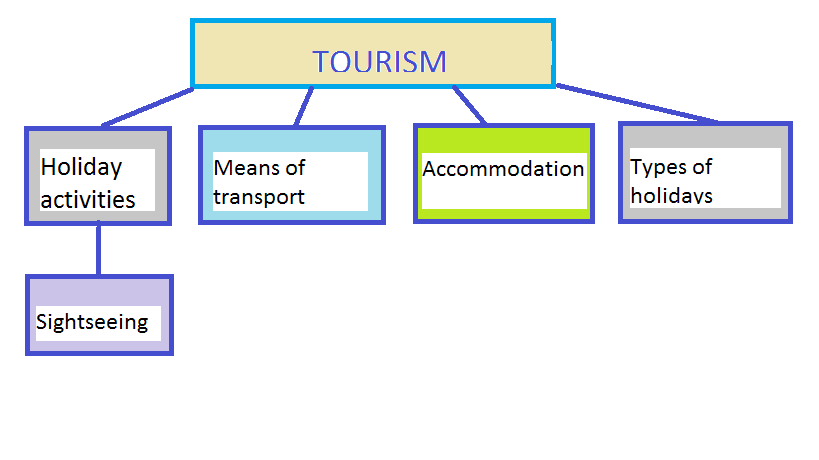 Отработка и закрепление лексики по теме.
Отработка и закрепление лексики по теме.
Teacher: . A lot of people all over the world are fond of travelling. They travel to see other countries, to enjoy picturesque places, to discover different ways of life or just for a change of scene. People travel on business and for pleasure having at their disposal various means of transport. So it is impossible to imagine our life without traveling. And of course people like to tell about their experience. Now we’ll listen to the story about travelling to Cuba.Учащиеся слушают текст и выполняют задания к нему.
Teacher: Some students from our group also want to tell us about their best holidays.
Учащиеся представляют свои проекты(презентации)
Развитие навыков диалогической речи.
Teacher: Travelling abroad you need to change money for local currency. Let’s try to change money.
Учащиеся в работают в парах, составляя диалоги по теме: «Обмен валюты», используя данные таблицы (приложение 1)
Could you change … into…., please.
Certainly, sir (madam).
What is the rate of exchange today?
… to…rubles.
Change one thousand, please.
Here you are.
Thank you.
III.Подведение итогов урока. Выставление оценок.Учитель подводит итоги урока и оценивает работу учащихся.Учитель: Let`s sum up. Today you`ve found out what kinds of travelling can be, answered the question “Why do people travel?”. You worked hard and your marks are ... At home, please make up a crossword or a chain word on the topic: “Tourism”. Good-bye! Приложение 1.List of circulating currencies by country or territory
| Countryorterritory[1] | Currency[2][3] | Sign[4] | ISO code[3] | Fractionalunit | Rate of exchange |
|  Australia Australia
| Australiandollar | $ | AUD | Cent |
|
|  Austria Austria
| Euro | € | EUR | Cent | 39,70 |
|  Canada Canada
| Canadiandollar | $ | CAD | Cent |
|
|  China, People'sRepublicof China, People'sRepublicof
| Chineseyuan | ¥ or元 | CNY | Fen[E] | 5,0 |
|  Cuba Cuba
| Cubanconvertiblepeso | $ | CUC | Centavo | 28,2 |
| Cubanpeso | $ | CUP | Centavo |
|
|  CzechRepublic CzechRepublic
| Czech krone | Kč | CZK | Haléř | 1,5 |
|  DominicanRepublic DominicanRepublic
| Dominicanpeso | $ | DOP | Centavo |
|
|  Egypt Egypt
| Egyptianpound | £ orج.م | EGP | Piastre[F] | 4,5 |
|  India India
| Indianrupee | 
| INR | Paisa | 0,57 |
|  Japan Japan
| Japaneseyen | ¥ | JPY | Sen[G] |
|
|  Russia Russia
| Russianruble | руб. | RUB | Kopek |
|
|  Thailand Thailand
| Thaibaht | ฿ | THB | Satang | 1,0 |
|  UnitedArabEmirates UnitedArabEmirates
| UnitedArabEmiratesdirham | د.إ | AED | Fils | 8,5 |
|  UnitedKingdom UnitedKingdom
| Britishpound[C] | £ | GBP | Penny | 46,80 |
|  UnitedStates UnitedStates
| UnitedStatesdollar | $ | USD | Cent[D] | 30,90 |
Класс: 8 «В», «Г».
Дата: 26.10.2014
Номер урока: 8
Преподаватель: Есимханова А.Н
Вид урока: урок совершенствования видов речевой деятельности.
Тема урока: «Проблемы экологии»
Цель урока: обобщить и закрепить лексический и грамматический материал модуля.
Задачи урока:
Практическая: практиковать навыки устной речи у учащихся.
Образовательная: повторить и закрепить лексико-грамматический материал модуля, учить понимать иностранную речь в игровых ситуациях.
Развивающая: развивать умение применения полученных умений и навыков в новых условиях, развивать навыки диалогической и монологической речи, развивать навыки аудирования и чтения.
Воспитательная: воспитывать уважительное отношение к мнению других людей, к природе; прививать интерес к изучению иностранного языка, воспитывать умение работать в коллективе.
Оснащение урока: классная доска, дидактический материал карточки с заданиями, таблички с названиями команд, жетоны, карточки со словами reduce, reuse, recycle, the, rule, of, three, r’s, звуковое приложение, отрывки статей), стенд, оформленный работами учащихся на экологическую тему.
Языковой и речевой материал
| Грамматический материал | Лексический материал |
| Употребление модальных глаголов и их эквивалентов | Закрепление лексики по теме |
План урока
Начало урока
Организационный момент
Приветствие
Основная часть урока
Завершение урока
Домашнее задание
Подведение итогов
Ход урока
1. Приветствие (1 минута)
T: Good morning, boys and girls! Glad to see you! How are you today?
P: I am fine (good, excellent, great, OK, all right, so-so) thanks.
2. Орг. момент. (1 минута)
T:Who is on duty today? Who is absent today? What is the date today? What is the day of the week? What is the weather like today?
P: I am on duty today. All are present. Today is… Today is … Today is (frosty, cold, snowy, windy, sunny, dark…)
3. Сообщение целей урока. (1 минута)
T: Today we are going to work with the words about nature. At the end of the lesson you must make up a conclusion: What must we do and what we must not do if we want to live in a beautiful town. Pupils are listening very attentively.
4. Речевая зарядка (5 минут) T: What do you do keep our town clean?
Pupils answer the question and then asked each other.
P1. I don’t smoke. What do you do to keep our town clean?
P2. I don’t throw litter in public places. What do you do to keep our town clean?
P3. I plant a tree every year. What do you do to keep our town clean?
P4. I pick up litter as walking in the parks. What do you do to keep our town clean?
P5. I never break glass bottles. What do you do to keep our town clean?
P6. I don’t cut wild flowers. What do you do to keep our town clean?
P7. I save the family’s newspaper to recycle. What do you do to keep the Earth clean?
P8. I turn off the light when I leave the room. What do you do to keep the Earth clean?
P9. I water the home flowers. What do you do to keep the Earth clean?
P10. I water the lawn early in the morning. What do you do to keep the Earth clean?
P11. I plant flowers in the garden. What do you do to keep the Earth clean?
P12. I never buy a fir tree to a New Year holiday. What do you do to keep the Earth clean?
P13. I save water. What do you do to keep the Earth clean?
All pupils all together: We love our town. It is our home.
5. Отработка лексики по теме “Природа” (7 минут)
T: Repeat the words, please.
Clean and fresh water, wonderful nature, to protect nature, to solve ecological problems, air pollution, environmental organization, litter, trash, rubbish, to damage trees, to frighten birds and animals, to make a fire, to throw rubbish into the river, to pollute water, things to be reused and recycled.
Task1: Find the synonyms.
1. Litter – rubbish – trash
2. To take care of – to protect
3. Fresh water – clean water
4. Environment – nature
5. To damage trees – to spoil
6. To throw litter – to pollute
7. To disturb animals – to frighten birds and animals.
Task 2: Find the antonyms.
1. To cut down trees – to plant trees
2. To kill birds and animals –
to protect animals
3. To destroy wildlife – to take care of
4. Throw away litter – to clean
5. To frighten animals – to take care of
6. To spoil environment – to respect
Task 3: Which word is not necessary?
1. Nature, planet, pollute, environment
2. To protect, to take care of,
to respect, to spoil.
3. Reduce, destroy, recycle, reuse.
4. Litter, disturb, trash, rubbish.
5. To spoil, to disturb, to protect, to hurt.
6. Беседа с учащимися о природе. Развитие навыков монологической речи (8 минут)
T: Many people like to live in cities. They like big houses, busy streets and cars. But they also love nature. During their vacations they go to the woods, to the seaside or spend a good time in the country. They like to watch animals, birds in the forest or in the fields.
a) What interesting things can you see when you go for a walk in the woods or in the fields? Have you ever seen animals in the forest?
b) And what can you see when you walk near a lake or a river?
c) What interesting things would you tell us?
P:1 Once when I walked in the forest I saw squirrels in a tree. It was interesting to watch them. They jumped from one tree to another. I threw them nuts and biscuits. They were hungry and they ate them.
P:2 Once I saw ducks. My friends and I were in the forest. Wе went there for mushrooms and berries. In the forest there was a lake and we saw ducks there. They were dark grey. It was fun to watch them.
P:3 I'd like to tell you about sparrows. They like to live in towns and villages. They like town streets and yards best. Sparrows can eat almost everything. They do not fly away when winter comes. They can live in very cold weather.
7. Поэтическая пятиминутка (5 минут)
Who wants to read poems about nature? Pupils read poems by heart.
1. The Earth is a garden.
It is a beautiful place
For all living creatures,
For all human race.
2. Food is a treasure
From the soil and the seas
Clean fresh air
From the plants and the heels.
3. Come to the woods
On a sunny day,
Come to the woods
On a day in May
Look at the grass
At the busy bees,
Look at the birds
In the green, green
All woods are home for animals
So, we behaved like guest.
We only looked and never touched,
The birds’ and rabbits’ nests
.
8. Беседа об экологической обстановке в нашем городе (15 минут)
T: One of the most serious problems is air pollution. More and more factories cars and lorries add their bad breath to the air. What can you say about this problem in Taraz?
Another serious problem in our town is water pollution. There are some of lakes around Taraz. People like to swim in hot summer days there.
What places in our town is the dirtiest?
How can you help to protect the environment? (Pupils work in groups).
One group answer the question: What must we do to protect nature?
And other group answer the question What must not we do? Cars are the world’s biggest air polluters. There are a great numbers of cars in Taraz.. In cold winter days their engines work day and night. They add their bad breath to the air.
But many lakes are dirty now. On the bank of the Taras. river there is a lot of litter. People leave bottles, paper, and food after their resting. Sometimes they throw them into the water and it is dangerous to swim there, because you may hurt your feet. That is why it is necessary to clean our lakes and park and keep them clean.
I think that some places in our town are needed in help. Among them the bankment of the Tesha river, forest in the 11 district, our park, lakes, many streets and yards.
1. We must keep the country tide.
We must grow flowers and trees.
We must leave wild flowers for others to enjoy.
We must protect our nature.
We must take care of birds and animals.
We must respect the life and work of the countryside.
We must put litter in the special bin.
We must recycle newspapers, bottles and metal cans.
We must feed birds in winter.
2. We should not throw trash in the streets or parks.
A lot of trash can be recycled.
We must not make fire in the forest.
We must not damage trees.
We must not kill birds and animals
We must not leave litter in the forest.
We must not throwing rubbish into the river.
9. Подведение итогов урока (1 минута)
T: What did we do at our lesson?
P: Today we repeat words about nature and discuss some environmental problems. We spoke about nature, and how make our town more beautiful and cleaner.
10. Домашнее задание (1 минута)
p. 87- 88 ex. 1 read, translate and answer the questions about National parks. Pupils write down home task for the next lesson.
11. Оценки (1 минута)
Teacher puts marks for pupils’ work.
Приложение 1


Приложение 2
The Rule Of Three R’s
Приложение 3
Card 1
animal, natural, global, moral
species, types ,kinds, station
potato, pear, apple, grape
reduce, cut down, compost, shorten
negative, global, positive, neutral
heap, keep, save, protect
reuse, reduce, rebel, recycle
Card 2
power
heap
peelings
against
inhabitats
rubbish
warming
Приложение 4
Приложение 5
Card 4
Each of us must to do something to protect the environment.
May you reuse plastic bottles and writing paper?
You can’t buy any products you don’t really need.
The last person to leave room need to turn off the lights and close the door.
We should plant more trees in the neighbourhood.
Класс: 9 «Б»
Дата: 26.10.2014
Номер урока: 18
Преподаватель: Есимханова А.Н
Тема урока: Достижение медицины в нашей жизни
Цели урока
Образовательные: совершенствование речевых навыков и умений.
а) развитие и совершенствование навыков диалогической речи (умение вести диалог-расспрос, диалог-обмен мнениями, умение запросить дополнительную информацию о себе).
б) совершенствование навыков монологической речи, умение высказываться логично и связно, продуктивно, умение анализировать и выражать свое мнение, описывать происходящие события. Развитие навыков чтения с выборочным извлечением нужной информации. Совершенствование навыков аудирования (аудирование с полным пониманием (listening for detail).
Развивающие: Учить логически мыслить, излагать, обобщать, сравнивать, анализировать, воображать; развитие личностной активности (перенос учебного материала на личность учащихся); развитие умения работать в парах; развитие учения воображать, драматизировать.
Воспитательные: воспитание отрицательного отношения к вредным для здоровья привычкам; воспитание положительного, уважительного, толерантного отношения к Британской культуре и осознание своей культуры, правил поведения.
Познавательные: знакомство учащихся с некоторыми факторами, касающимися здорового образа жизни людей в Великобритании и Казахстана, их отношении к полезным и вредным для здоровья привычкам.
Оснащение: Word-web chart (Ключевое слово “Health”; Факторы, влияющие на здоровье: хор. и плохие привычки, пища, которую мы едим, регулярность в жизни, активная деят-ть, средства по уходу за собой, медицина, влияние окружающей среды); карточки со словами и фразами; аудиозаписи песни и текста; плакаты против губительных для здоровья привычек (табакокурения, алкоголизма, наркомании); афиша; выставка восковых фигур “На грани…”, посвященная теме “Нет наркотикам”; текст “The luncheon” (Sоmerset Maugham); вопросы к тексту; четыре картинки к ролевой игре “Регулярность в жизни способствует здоровью”; необходимое оснащение (медицинские предметы) для ролевой игры; карточки-опоры для ролевой игры — 2 шт.; карточка ролевая — 1 шт.; карточки для работы в парах — 9 шт.; проект “An average student”, таблица; проект “What measures should be taken to be healthy in our school”, 8 картинок к проекту, круговая диаграмма.
Ход урока
I. Начало урока. Приветствие. Сообщение учителем целей и задач урока.
T. Good morning!
I’m glad to see you! Are you in a good mood?
How do you start your morning?
Предполагаемые ответы уч-ся
In the morning I usually do exercises.
My morning begins with a shower.
My morning begins with a cup of tea; a glass of juice and so on.
T: Our lesson is devoted to health. Today we are going to discuss some health problems.
II. Работа с лексическим значением слов (объяснить значение слов по-английски).
Ta Cl.
T: Try to explain the meaning of these words and expressions. (см. Приложение 1).
Meal – food we eat a certain times of the day.
Food – what people eat in order to grow or stay alive.
Fast food – food that is prepared and served quickly to customers.
Healthy food – special king of fool that people eat because they think it’s good for their health.
To be hungry – to have a feeling caused by a desire to eat.
To be thirsty – to have a feeling caused by a desire to drink.
Breakfast – the meal eaten in the morning.
Dessert – course of fruit, etc. at the end of the meal.
Fast food restaurant – restaurant where you can order hot food, which is served quickly.
Protein – body-building substance essential for good health, in such foods as milk, eggs, meat, cottage cheese.
Overweight – excess of weight above what is usual or legal.
To be fit – to be healthy and physically strong.
To keep fit – to remain fit by doing exercise, sport.
To exercise – to practice physical activity in order to stay healthy and become stronger.
To be slim – to have an attractive thin and well-shaped body.
Slimmer – a person who follows a diet.
Disease – illness.
Wholemeal bread – baked from flour containing everything in the grain.
To snack – to eat something in a hurry.
Fish and chip shop – shop, which sells hot food such as fish and chips, fried chicken, sausages, meat pie, etc.
Health care products – beauty products help us look great.
A calorie is the energy value of food.
T: Well done! Thank you!
III. Заполнение таблицы и обсуждение некоторых факторов, влияющих на здоровье.
T: Health depends of several factors.
1). Обсуждение  полезных и вредных для здоровья привычек.
полезных и вредных для здоровья привычек.
T: Speaking about healthy life, we realize some people care about their health (they have good health habits), others don’t (they have bad health habits).
T: What good health habits do people have?
Предполагаемые ответы уч-ся. People with good habits follow well-balanced diet, eat wholemeal bread, high fiber food, low fat food, vegetables and fruit, which are rich in vitamins and minerals.
People exercise every day, go in for sport, try to have regular rest and avoid sleeping too much or too little.
T: What bad health habits do people have?
Предполагаемые ответы уч-ся. It’s bad for health sleeping too much or too little. Snacking or skipping regular meals lead to stomach disease.
Eating high fat food, overeating lead to obesity.
Eating too much sweets leads to obesity, teeth disease.
Physical inactivity is a bad habit too.
It’s bad for health when a person smokes or drinks alcohol.
Taking drugs is harmful for teenagers and grown-ups.
T: These bad habits are really deadly.
T: What measures should be taken against bad health habits?
Предполагаемые ответы: It’s necessary to think about your health. You should eat low-fat food and more fiber. You should exercise more not to be fat. You should follow well-balanced diet. Go to bed in time and get up early. You should avoid gaining weight cutting out snacks. Eat less of everything. Don’t eat at night.
2). Аудирование.
Ex 4 3)b) p106 (см)
Script.
In recent years smoking has received a lot of bad publicity in G.B. Many companies have banned smoking in their offices and canteens. Smoking is banned on the London underground, in cinemas and theatres and on most buses.
There are special smokers carriages on trains. An official warning printed by law on all cigarette packets. Cigarette advertising is banned on television and radio.
T: What measures should be taken against smoking? Listen to what measures are taken against smoking in G.B. What measures are taken against smoking in G.B.?
Предполагаемые ответы: P1: Smoking is banned in public places.
Cigarette advertising is band on television and radio.
T: I would like to add some firms don’t employ people who are smokers. T: What is the situation in our country? Предполагаемые ответы:People don’t smoke in public places, there are official warning on all cigarette packers too. Cigarette advertising is banned on television and radio too.
T: But unfortunately, a lot of teenagers have been smoking when they are at the age of 13 or 14.
Do you know why? Предполагаемые ответы: Maybe, some of them start smoking because they think it’s “cool”, others don’t think it is harmful.
T: What diseases can smoking cause? Предполагаемые ответы:Smoking causes a number of heart lung diseases such as pneumonia, cough, cancer. Smoking harmfully effects to teenagers and people around them.
T: About 70% of teenagers are smokers. Go to the blackboard and read a poster.
P1 (зачитывает информацию о вреде курения).
T: Say “no” to smoking. Another serious problem is drinking alcohol. What’s your attitude towards this bad habit? Предполагаемые ответы: Drinking alcohol affects your social control and your knowledge, cause a lot of serious diseases, such as heart disease, brain disease, headache.
T: P2 go to the blackboard and read a poster. (зачитывает информацию о вреде алкоголя) Say “no” to drinking alcohol. Taking drugs is dangerous for people’s health. Go to the blackboard and read the information. (зачитывает информацию о вреде наркотиков). Two weeks ago we visited the museum in the town of Abakan. There was a new exhibition of wax figures devoted to the problems of drugs. Tell us some words about it.
(см. Приложение 3).
The aim of this exhibition was to show the destroying power of drugs. There are no light drugs! Use of drugs changes the way people think and the way they view the world around them. Use of drugs leads full destruction of the body. The video film was shown on TV It was awful. Using drugs leads to different diseases, such as cancer, AIDS. We saw wax figures of famous musicians Kurt Kobein, John Lennon, Elton John, Freddy Mercury.
T: What did they have in common? P2: Using drugs.
P1 Freddy Mercury couldn’t give up using drugs. As a result he got AIDS. He knew he would die. At his last concert he sang a song “The show must go on”
IV. Проектная работа. Обсуждение среднего ученика нашего класса. Правильный ли образ жизни он ведет? (Приложение 5). P1 рассказывает по таблице анализ своей работы, делает выводы и задает вопросы уч-ся.
V. Развитие навыков диалогической речи Обсуждение фактора, влияющего на здоровье человека: пища, которую мы едим.
1). диалог-расспрос. (Приложение 6).
(Приложение 7).
T: Our health depends on the foods we eat. Each country has its own eating habits. Listen to the dialogues to see which food is better. (Обсуждение диалога).
T: Which national food is better? Предполагаемый ответ: I think, Kazakh and English food is nice, but it’s quite different. I think it’s necessary to follow well-balanced diet.
T: What is a well-balanced diet? Предполагаемый ответ: It is food contains proteins, carbohydrates, fats, vitamins and minerals.
T: Schoolchildren need …. Calories a day. What kind of food should be used by teenagers?
They often eat unhealthy food as well. What is useful for their health? Предполагаемый ответ: Food, which is rich in vitamins and minerals. Vegetables and fruit are good for their health.
T: What products are rich in vitamins? Предполагаемый ответ: Fish, eggs, poultry, meat, cottage cheese are rich in proteins.
T: What food gives us energy? Предполагаемый ответ: Fats, oil, carbohydrates give us energy but they should be used in small quantities
T: Teenagers in Britain also think about what they eat. What do they do in order to stay healthy?
Предполагаемый ответ: In order to stay healthy they have personal healthy living guides. They learn how to follow well-balanced diet.
T: Do all people keep well-balanced diet? Предполагаемый ответ: Of course, not.
T: As Jerome K. Jerome said “We are the slaves of our stomach” Food influences our mind and our behaviour. A lot of examples are given in literature.
VI. Развитие навыков чтения. (Reading for gist). Задание: Прочитать текст и ответить на вопросы.
T: Look through the story “The luncheon” by Somerset Maugham and be ready to answer the questions. Questions: (Приложение 8).
VII. Диалогическая речь. Обсуждение фактора, от которого зависит наше здоровье через диалогическую речь “Средства по уходу за собой” Диалог – отстаивание своего мнения. (Приложение 9).
T: People usually pay much attention to their appearance. A lot of health care products help us look great.
T: Now you see it’s not easy to be a healthy person.
VIII. Работа по карточкам. Обсуждение факторов, влияющих на здоровье человека, это “медицина” и “влияние окружающей среды”. (Работа в парах).
T: As for the other students I want you to talk about medicine and environmental influence in pairs with one person asking the question and the other answering them. Ask you classmates for a more focused information.
I’ll give you 2 or 3 minutes for preparation! (Приложение 12).
XII. Заключительный этап урока. Подведение итогов урока .
Оценки за урок (прокомментировать).
T: Well done! Thank you for the work you have done.
Фотографии (Приложение 15).
10

 Получите свидетельство
Получите свидетельство Вход
Вход









 Отработка и закрепление лексики по теме.
Отработка и закрепление лексики по теме.









 Разработка урока по английскому языку на тему "Мой дом" (2.94 MB)
Разработка урока по английскому языку на тему "Мой дом" (2.94 MB)
 1
1 1270
1270 180
180 Нравится
0
Нравится
0


